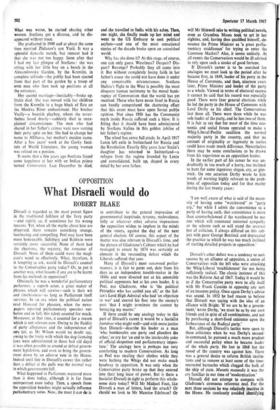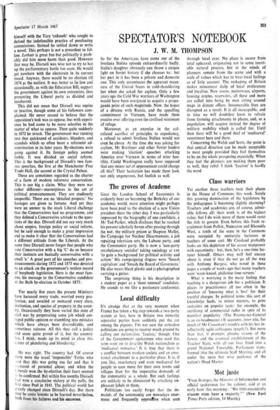What Disraeli would do
OPPOSITION ROBERT BLAKE
Disraeli is regarded as the most potent figure in the traditional folklore of the Tory party —and rightly so, if sometimes for the wrong reasons. Yet, when all the myths about him are dispersed, there remains something strange, fascinating and compelling. Peel may have been more honourable. Salisbury and Baldwin were certainly more successful. None of them had the charisma, the mystery, the romance of Disraeli. None of them could wave the magi- cian's wand so effectively. What, therefore, it is tempting to ask, would be Disraeli's counsel to the Conservative party today? Or, to put it another way, what lessons if any are to be learnt from his methods in opposition?
Obviously he was a wonderful parliamentary performer, a superb actor, a great maker of phrases which will survive—such is their wit and timelessness—as long as Parliament itself survives. In an era when the political nation read Hansard for pleasure, when the news- papers reported parliamentary speeches ver- batim and in full, this talent counted for much. Moreover, at that time, it counted for a reason which is not relevant now. Owing to the fluidity of party allegiances and the independence of MPS (or, as Mr Wilson would no doubt say, owing to the laxity with which the dog-licensing laws were administered in those bad old days) it was often possible to amend or defeat govern- ment legislation, and even to bring the govern- ment down by an adverse vote in the House. Indeed until late in Disraeli's career this rather than a defeat at the polls was the normal way in which governments fell.
What happened in Parliament mattered more than it does today, although it is far from unimportant even today. Then, a speech from the opposition benches might actually influence parliamentary votes. Now, the most it can do is to contribute to the general impression of governmental ineptitude, tyranny, malevolence, folly or whatever other adverse impressions the opposition wishes to implant in the minds of the voters, against the day of the next general election. Of course, this aspect of the matter was also relevant in Disraeli's time, and the picture of Gladstone's Cabinet which he had managed to create by 1874 was certainly an element in the resounding defeat which the Liberals suffered that year.
Many of Disraeli's most renowned perfor- mances, it is fair to point out, date from his days as an independent trouble-maker in the 1840s and were directed not at his ostensible political opponents but at his own leader. It is Peel, not Gladstone, who is 'the political Petruchio who has outbid you all,' or the Sul- tan's Lord High Admiral who had 'an objection to war' and steered his fleet into the enemy's port 'that I might terminate the contest by betraying my master.'
If there could be any analogy today to this part of Disraeli's career it would be a Socialist frondeur who might well—and with more justice than Disraeli—describe his leader as a man 'who bamboozles one party and plunders the other,' or cry for 'an end to the intolerable yoke of official despotism and parliamentary impos- ture.' The analogy here is perhaps not very comforting to modern Conservatives. As long as Peel was stealing their clothes while they were bathing the Whigs did not make much headway in opposition. It was only when the Conservative party broke up that they entered into their long lease of power. But is there a Socialist Disraeli in sight to perform this whole- some duty today? Will Mr Michael Foot, like Disraeli a man of letters, lead the attack? Or should we look to Mr Maurice Edelman? Or
will Mr Shinwell take to writing political novels, even as Grandma Moses took to art in her eighties, and, having thus qualified himself, de- nounce the Prime Minister as 'a great parlia- mentary middleman' for trying to enter the Common Market? Alas, it seems unlikely. At all events the Conservatives would be ill advised to rely upon such a stroke of good fortune.
If Disraeli's career is to be searched for analogies we must look to the period after he became first, in 1849, leader of his party in the House of Commons, and then, nineteen years later, Prime Minister and leader of the party as a whole. Viewed in terms of electoral success it cannot be said that his record was especially good. There were four general elections while he led the party in the House of Commons with Lord Derby as his chief. The Conservatives lost them all. There were three while he was sole leader of the party, and he lost two of them. It is fair to say that for most of the time eco- nomic and social forces operated to make a Whig-Liberal-Peelite coalition the normal majority party in the country, and that no amount of originality or ingenuity in tactics could have made much difference. Nevertheless there may be some conclusions to be drawn from his experience as an opposition leader.
In the earlier part of his career he was un- doubtedly in too much of a hurry, too inclined to hunt for some ingenious slogan, cry, or gim- mick. On one occasion Derby wrote to him words of warning highly relevant to the prob- lems of opposition today and for that matter during the last twenty years: 'I am well aware of what is said of the neces- sity of having some "watchword" or "party cry," but while I admit the convenience to a party of having such, that convenience is more than counterbalanced if the watchword be not one which will command universal sympathy or the scheme such as will stand the severest test of criticism. I always differed on this sub- ject with poor George Bentinck and deprecated the practice to which he was too much inclined of starting detailed projects in opposition.'
Disraeli's other defect was a tendency to seek success by an alliance of opposites, a union of Conservatives with the left who were attacking the Whig-Liberal 'establishment' for not being sufficiently radical. The classic instance of this was the Reform Act of 1867. Today it would be as if the Conservative party were to ally itself with Mr Frank Cousins in opposing any sort of an incomes policy. Once again Derby's advice was sound. In 1852 he had reason to believe that Disraeli was toying with the idea of an alliance with Blight. 'If we are to be a govern- ment,' wrote Derby, 'we must be so by our own friends and in spite of all combinations, and not by purchasing a short-lived existence upon the forbearance of the Radical party.'
But, although Disraeli's tactics were open to these criticisms when he was Derby's second- in-command, he pursued a much more prudent and successful policy when he became leader of the whole party. He lost in 1868 but the mood of the country was against him. There was a general desire to reform British institu- tions and to remove at least some of the time- encrusted barnacles which clogged the bulk of the ship of state. Mutatis mutandis it was the cry familiar in our time of 'modernisation.'
Disraeli did not attempt to compete with Gladstone's strenuous reformist zeal. For the next three sessions he was relatively inactive in the House. He cautiously avoided identifying himself with the Tory 'colonels' who sought to defend the indefensible practice of purchasing commissions. Instead he settled down to write a novel. This perhaps is not a precedent to fol- low. Lothair is great fun but politically it prob- ably did him more harm than good. However that may be, Disraeli was wise not to try to hot up the parliamentary battle too soon. He would get nowhere with the electorate in its current mood. Anyway, there would be no election till 1874 at the earliest. It was better to lie low and occasionally, as with the Education Bill, support the government against its own extremists, thus presenting the Liberal party as divided and incoherent.
This did not mean that Disraeli was supine or inactive, though some of his followers com- plained. He never ceased to believe that the opposition's task was to oppose, but with experi- ence he had come to be more selective in the matter of what to oppose. Then quite suddenly in 1872 he struck. The government was running into that quicksand of accidents, blunders, and scandals which so often beset a reformist ad- ministration in its later years. By-elections were going against it. Its foreign policy seemed feeble. It was divided on social reform. This is the background of Disraeli's two fam- ous speeches, the first at the Manchester Free Trade Hall, the second at the Crystal Palace.
These are sometimes regarded as the charter of a form of modern reformist conservatism. This is too big a claim. What they were was rather different—masterpieces in the art of political pronouncement. They are studiously unspecific. There are no 'detailed projects.' No hostages are given to fortune. And yet they were an answer to the stock Liberal challenge that the Conservatives had no programme, and they defined a Conservative attitude to the ques- tions of the day. Disraeli did not say very much about empire, foreign policy or social reform, but he said enough to make a great impression and to make it clear that the Conservatives had a different attitude from the Liberals. At the same time Disraeli never forgot that people who vote Conservative with a big 'C' do so because their instincts are basically conservative with a small `c.' A great part of his speeches and pro- nouncements during 1872 and 1873 was devoted to an attack on the government's restless record of busybody legislation. Here is the most fam- ous, his message to the Conservative candidate at the Bath by-election in October 1873: 'For nearly five years the present Ministers have harassed every trade, worried every pro- fession, and assailed or menaced every class, institution, and species of property in the coun- try. Occasionally they have varied this state of civil war by perpetrating some job which out- raged public opinion or stumbling into mistakes which have always been discreditable, and sometimes ruinous. All this they call a policy and seem quite proud of it, but the country has, I think, made up its mind to close this career of plundering and blundering.'
He was right. The country had. Of course there were the usual 'responsible' Tories who 'aid that this was going too far and that it savoured of personal abuse; and when the liberals won the by-election their fears seemed to be confirmed. But within five months Disraeli had won a conclusive victory at the polls, the first since Peel in 1841. The political world has greatly changed since Disraeli's day. But there may be some lessons to be learned nevertheless, both from his failures and his successes.































 Previous page
Previous page